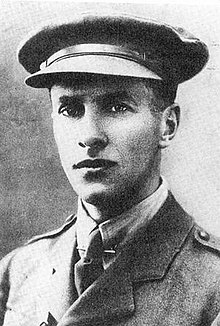Walter Duranty
Walter Duranty (born May 25, 1884 in Liverpool , † October 3, 1957 in Orlando , Florida ) was a British journalist and Pulitzer Prize winner , whose Stalinism- friendly reporting caused a controversial sensation in the 1930s.
Life
Born in Liverpool, Duranty began his journalistic career in France and Riga, and from 1921 he worked as a correspondent in the Soviet Union . In 1929 Josef Stalin granted him an exclusive interview. Subsequently, Duranty commented on the path of the Soviet Union in a Stalin-friendly way, whereby he did not deny the brutality of the regime, but explained and justified it on the basis of the historical and economic realities of Russia. In the series of articles for the New York Times that brought Duranty the Pulitzer Prize in 1932, for example, he argued that the Russian people, because of their “Asian mentality”, needed despotic leadership and collective economic systems. The economic liberalization of Lenin 's NEP phase, on the other hand, had failed because it was based on too "western" principles. In an article dated June 24, 1931, Duranty described the kulaks , the opponents of forced collectivization in the Soviet Union , as an “almost privileged class” that was formed through “mistakes” by Lenin. Duranty showed understanding for the destruction of this class, the number of which he put at around 5 million. He compared Stalin with the biblical prophet Samuel , but also with the Asian conqueror Tamerlan .
The exposure of the famine in Ukraine (now mostly called Holodomor ) by Gareth Jones and Malcolm Muggeridge contradicted Duranty with an article in the New York Times of March 31, 1933 (Russians Hungry, But Not Starving) . Duranty's statements later led to a (still ongoing) debate as to whether he had deliberately lied or whether he had just surrendered to Stalinist propaganda. There were also calls for the Pulitzer Prize to be withdrawn from him.
In 1990 the New York Times admitted that his kind reports on the Soviet Union were "some of the worst reports in the newspaper."
Publications (selection)
- The Curious Lottery and Other Tales of Russian Justice (1929)
- Red Economics (1932)
- Duranty Reports Russia (1934)
- I Write as I Please (1935)
- One Life, One Kopeck (1937)
- The Gold Train (1938)
- The Kremlin and the People (1941)
- Search for a Key (1943)
- USSR: The Story of Soviet Russia (1944)
- Stalin and Co .: The Politburo - The Men Who Run Russia (1949)
literature
- SJ Taylor: Stalin's Apologist: Walter Duranty, the New York Times's Man in Moscow. Oxford University Press, 1st ed. 1990. ISBN 978-0-19-505700-3 .
Web links
Individual evidence
- ↑ Fight to the last dog. In: The time. Retrieved June 26, 2016 : "When Stalin starved millions of Ukrainians to accelerate the forced collectivization of the Soviet Union, he was defended by Times correspondent Walter Duranty"
- ↑ a b Ukraine: The Reporter and the Hunger Terror. In: DiePresse.com. Accessed on June 26, 2016 : “A journalist who worked for the New York Times in the 1930s and deliberately falsified history is to blame. Actions on the occasion of the "Holodomor" are therefore not only taking place in Ukraine, but also in New York. A broad international audience calls on the newspaper to return the Pulitzer Prize, the most prestigious award for journalistic achievement in the USA. "
- ^ Karl E. Meyer: The Editorial Notebook; Trench coats, Then and Now. In: The New York Times . June 24, 1990, accessed August 3, 2020 .
| personal data | |
|---|---|
| SURNAME | Duranty, Walter |
| BRIEF DESCRIPTION | British journalist and Pulitzer Prize winner |
| DATE OF BIRTH | May 25, 1884 |
| PLACE OF BIRTH | Liverpool |
| DATE OF DEATH | October 3, 1957 |
| Place of death | Orlando , Florida |
